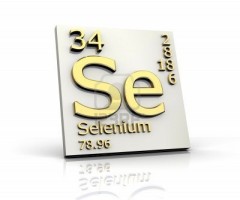THE SELENIUM CAN INCREASE THE SURVIVAL IN CANCER
Supplements of selenium

Swedish research reveals how a patient with breast cancer with a higher intake of selenium before diagnosis of the disease is more likely to survive.
Swedish scientists have discovered a link between the intake of selenium and the chances of survival in breast cancer. When they analyzed 3,146 patients with breast cancer, they found that women who took higher doses of selenium before diagnosis, had a 31 percent chance of survival compared to those who received lower doses of selenium. Researchers have associated the highest intake of selenium is to better survival breast cancer that with improved survival in general. The study, which was published in the journal Breast Cancer Research and Treatment, confirms previous studies which have found a protective effect of selenium against certain forms of cancer.
A low intake of selenium
All study participants were part of the Swedish Mammography Cohort. Before that they be diagnosed with invasive cancer of the breast, the patients had completed food questionnaires designed to assess the daily intake of selenium. Thanks to this material collected, the researchers were able to arrive at their conclusions about the correlation between consumption of selenium and chances of survival. The average intake of selenium between the participants was less than 25 micrograms per day, which is a very low amount if one considers that the RDA (recommended daily intake) for selenium is between 50 and 70 micrograms, depending on the different countries.
Selenium acts as a support for important proteins
Selenium, found in fish, nuts, whole grains, and a variety of other foods, supports a variety of proteins employees (called selenoproteins) are vital to the body, some of which are important for their action in combating cancer and for heart health. At the beginning of the year, a group of cardiologists Swedish has found that within a large sample of elderly persons who had received 200 micrograms of selenium (SelenoPrecise) per day, together with coenzyme Q10, for a period of five years, the risk of death from cardiovascular causes was 54% lower than the norm.
References
1. Harris HR, et al. Selenium intake and breast cancer mortality in a cohort of Swedish women. Breast Cancer Res Treat. 2012, 134:1269-77.
2. Alehagen U, et al. Cardiovascular mortality and N-terminal-proBNP reduced after combined selenium and coenzyme Q10 supplementation. Int J Cardiol. , 2012. E-pub ahead of print.
Supplements of selenium
